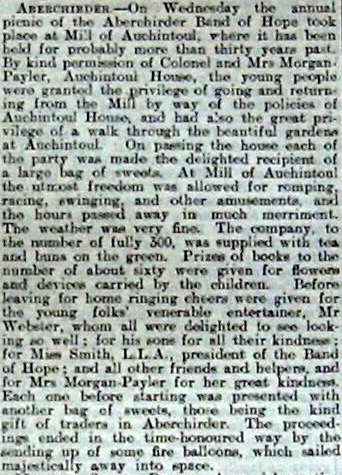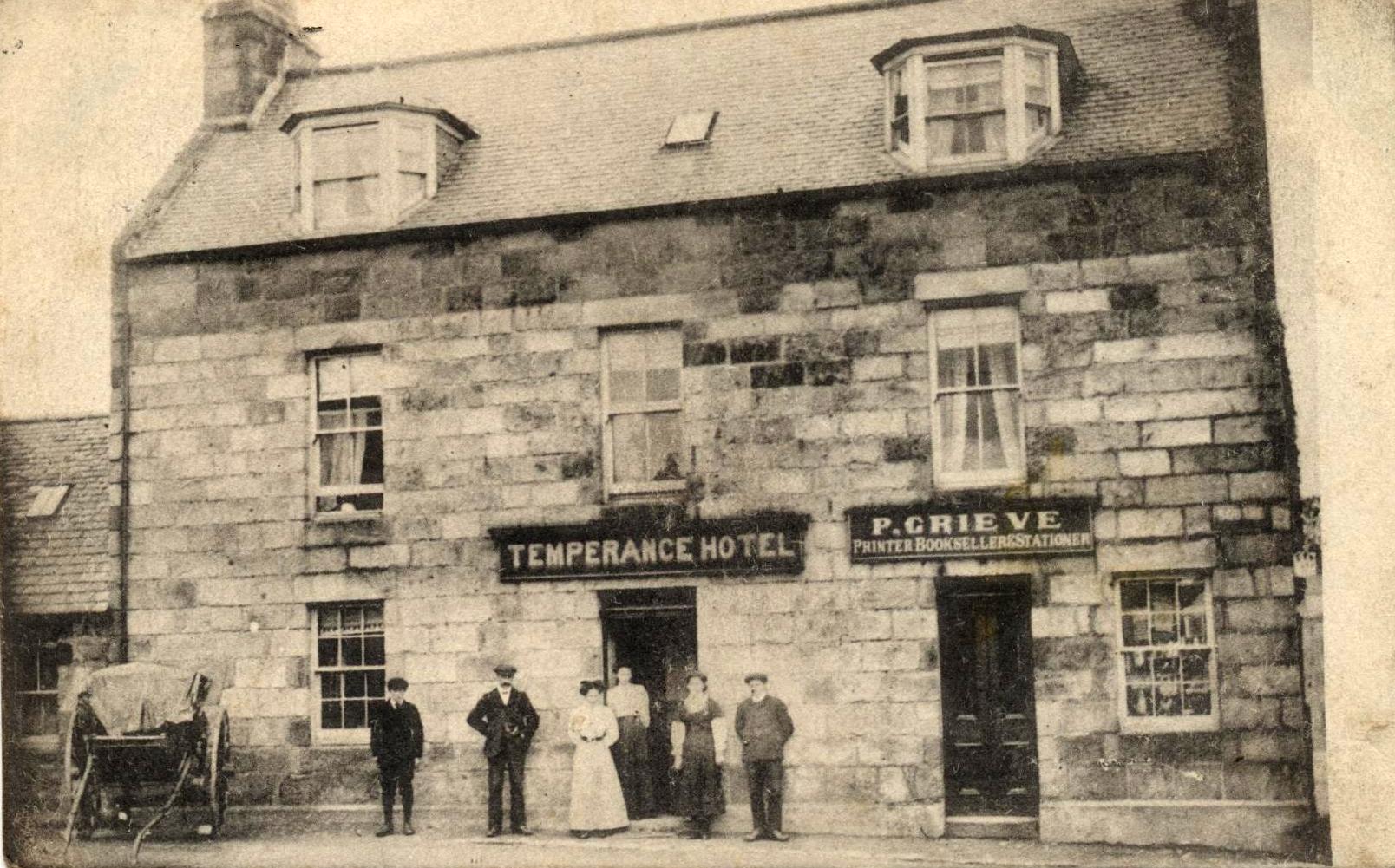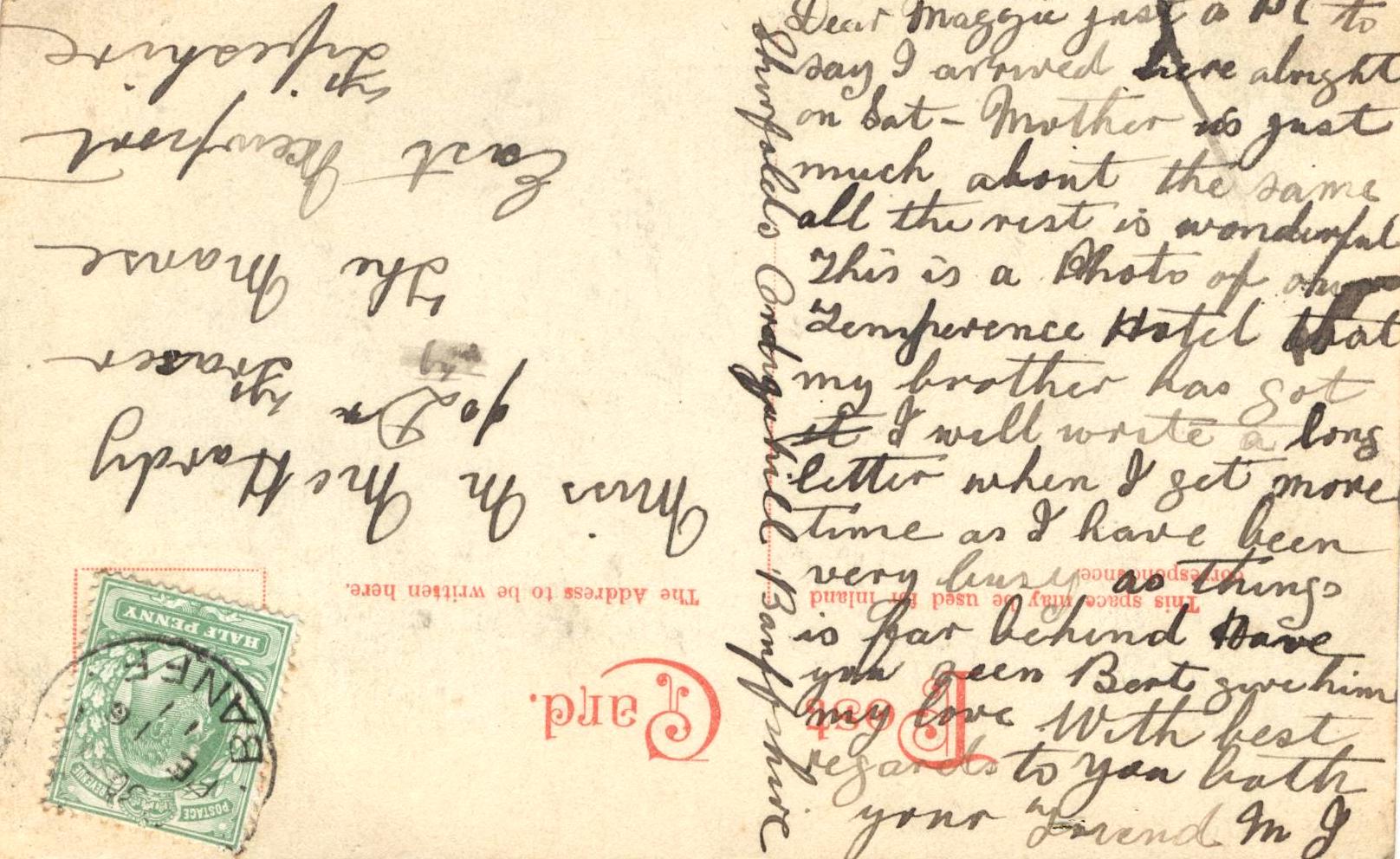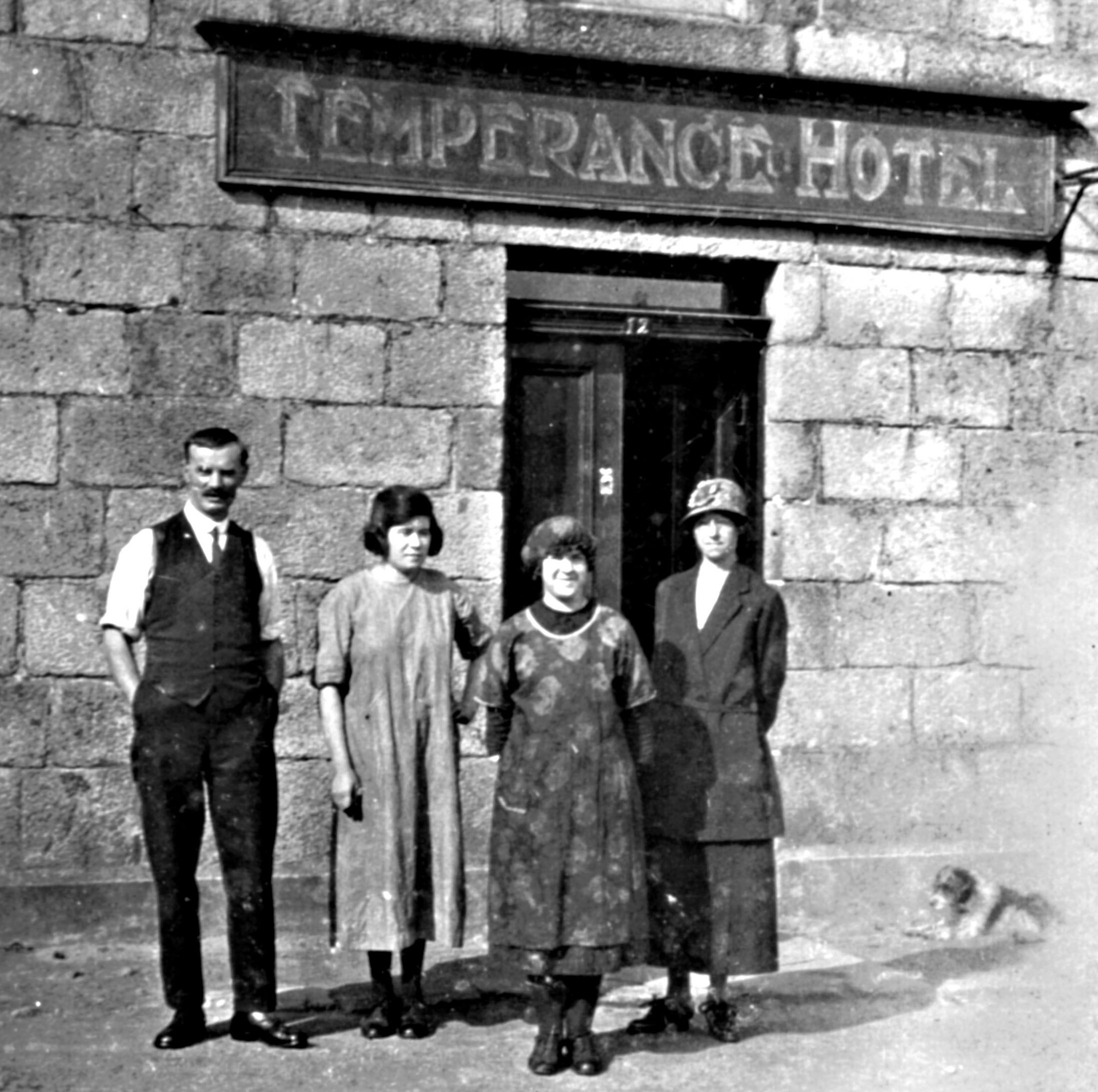Temperance
Following the union of the United Free Church with New Marnoch Free Church in Main Street, Rev McRaith retired to Ayr in 1907 and five years later sold the hotel to Mrs Katherine Cook of Kew, Surrey. Her tenants were Henry Farquhar (1909-10), William Johnson (1911-12), James Johnston (1912-13 to 1917-18) and his widow Maggie (1918-9 to 1920-21).
In 1922 the Temperance Hotel was sold to John Watt and then in the following year to Hugh & Mrs M Gunn. The building remained in business with various owners until 1957-58, when it became a private house.
The postmark date is 16 Feb 1911 and the message includes “…This is a photo of Temperance Hotel that my brother has got…” so, going by sender’s initials MJ, the people in the photograph could well include William Johnson– although possibly be the previous tenants (Farquhar).
This photograph was supplied by Vicki McFall and shows her great-grandfather Hugh Alfred Edward Gunn, two ladies in servant’s clothing – Dolly and Mabel Duncan who worked in the hotel – and an unnamed lady. Hugh’s dog Barney completes the group.
The Banffshire Journal of 6 February 1900 described a meeting of the Total Abstinence Society meeting, Provost Auchinachie presiding. It involved readings, recitations, etc. and songs from some young people from the Band of Hope.
This was one of many temperance societies set up during the 19th Century to save people from alcohol abuse. Aimed at children, it combined education with entertainment by organising outings, concerts and lantern lectures, and believed in rewards such as medals, certificates and books. Jessie Smith, the celebrated Foggie teacher first at St Marnan’s and then Aberchirder School, was President of the local Band of Hope. Most years a pre-summer holiday treat for Aberchirder children was an afternoon off school for the Band of Hope picnic, held from the 1870s onwards at Mill of Auchintoul courtesy of Mr Webster and occasionally at Auchintoul House. In addition a Sunday School picnic was held around the same time by the United Presbyterian Church which, along with the Free Church, strongly supported the temperance movement.
The Banffshire Journal gave this account of the 1906 Band of Hope picnic:

Another local temperance group which seems to have been short-lived is mentioned in the Banffshire Journal of 15 December 1914:
Good Templar Lodge – formed, to be called St Marnan’s Good Templar Lodge, as the result of a well-attended meeting in the Town Hall on Friday, addressed by speakers from Stirling, Huntly, etc. Appointed – Chief Templar, Bro Robson Peacock; Vice-Templar, Madge Clark; Secretary, Sister A Anderson; Treasurer, Sister Mary Lyon; Chaplain, Bro John Lyon; Marshall, Bro Andrew Auld; Guard, Bro William Duncan; Sentinel, Charles Sim.
Veto Polls
The Temperance (Scotland) Act 1913 had given voters in small local areas powers to hold a poll to decide whether alcoholic drinks should continue to be sold. The first Scottish Local Veto Polls were taken in 1920, when more than forty districts voted for a no-licence resolution.
Aberchirder Town Council received a requisition under the Temperance Act demanding a poll, signed by 25% of the electors. (Other Banffshire polls were called for in Cullen, Keith, Macduff, Buckie, Portknockie, Findochty, also Rathven including Portgordon and Keith including Newmill).
During a vigorous campaign one speaker (a member of the licensed trade) argued that a ban would be undemocratic, as residents of the rural parts of the Parish of Marnoch had no pubs and depended on ones in Foggie – but they were not entitled to vote!
The Banffshire Journal of 9 Nov 1920 carried a whimsical report of the Foggie poll:
Aberchirder decisively voted itself a ‘wet’ community on Tuesday last when the Local Veto poll was held. As in most burghs in the country the voting resulted in a substantial majority for the ‘no change’ resolution, to the disappointment, no doubt, of those who had entertained the hope of seeing this isolated town become a ‘pure and undefiled’ spot amidst its purer and still more undefiled surroundings, but it turned out otherwise, no doubt to the gratification of the seemingly larger number who believe that the town should rather be as an oasis in a desert to which dwellers in the surrounding world of crofts may come to be refreshed. The actual result of the poll was No change 205, limiting resolution 1, no license 96; majority for no change 108. There is a local government electorate in the burgh of 411, and of these 305 went the poll…
The scene of the ballot was the town hall [later to become the back hall of Marnoch Memorial Hall] …The weather was dry and favourable and the polling booth was open from eight o’clock in the morning until eight at night…Quite a feature of the poll was the number of women who took advantage of their new-found franchise [under the Representation of the People Act 1918]. After six o’clock the men-folk … after recording their votes congregated in groups to discuss the topic of the day… A favourite argument seemed to be that the drink traffic was one of the mainstays of business in Aberchirder and that … farmers liked to transact business over a glass of aqua vitae [whisky] and if Aberchirder went ‘dry’ they would go to some place where they could still follow this pleasant system, with a consequent loss of trade to the burgh …There was much talk and shaking of heads over the revelation that while only 96 had voted for ‘no license’ the requisition for the poll had contained some 130 names…
Some people gathered in the Square… and about 9 o’clock a few young people made an attempt at a firework display by setting off a few small rockets and crackers and when these gave out they secured a large wisp of straw which they saturated in paraffin and set alight near the fountain as a bonfire.
While the United States introduced Prohibition in 1920, this was the first, and last, attempt to point Foggie in that direction!



